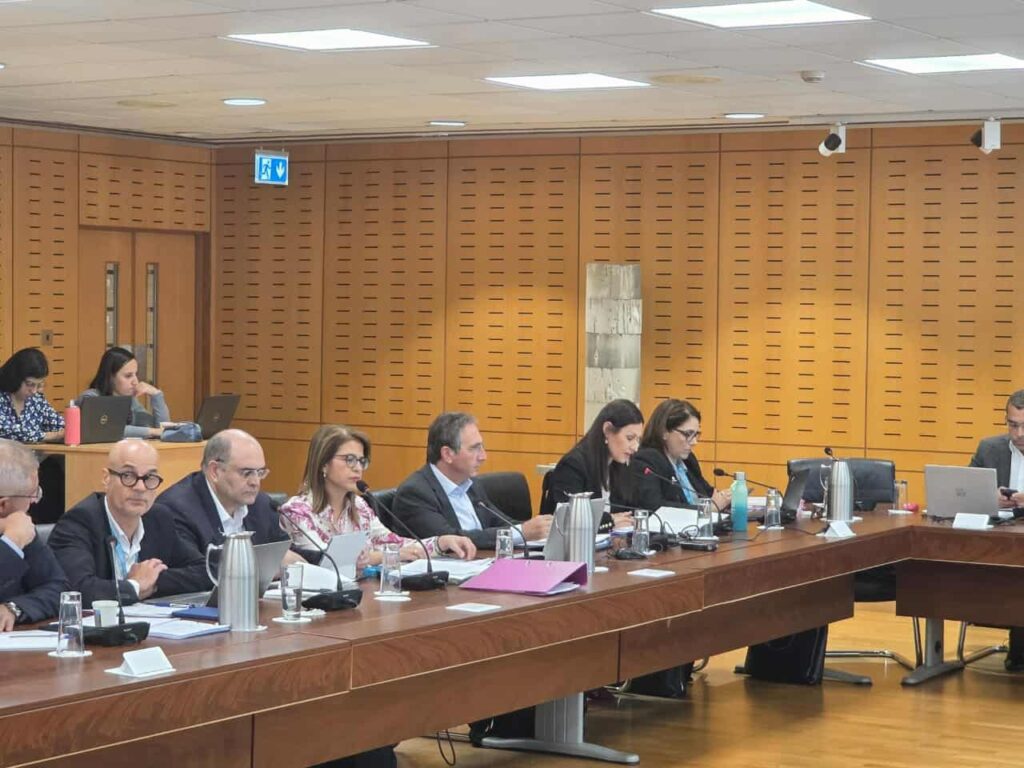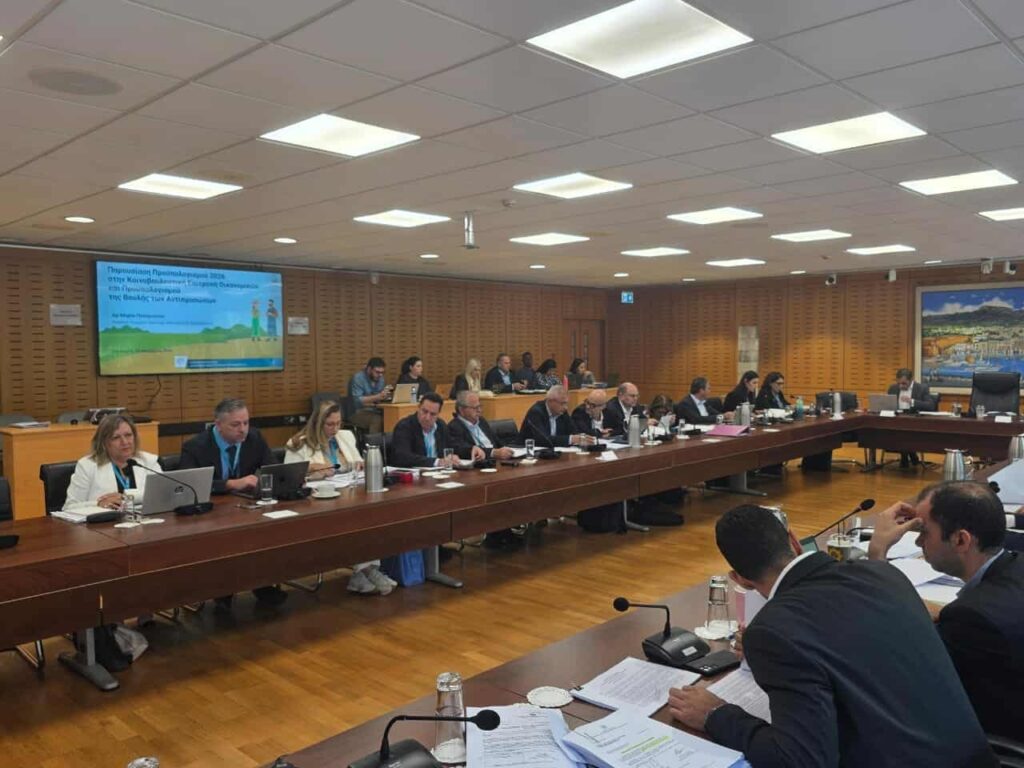Filenews 3 November 2025 - by Angelos Nikolaou
Focusing on sustainable development, the green transition and the support of farmers, the Budget of the Ministry of Agriculture, Rural Development and Environment (YGAAP) for 2026 was presented yesterday before the Parliamentary Committee on Finance. Minister Maria Panayiotou analyzed the key priorities and actions planned for the coming year, underlining the crucial role of the sector in the transition towards a green and resilient economy.
According to the data presented, the total budget of the YGAAP for 2026 appears to be increased compared to 2025, with the aim of strengthening rural development, the management of natural resources, the protection of the environment and the prevention of climate change.

The Minister stated that the main policy axes focus on:
● the implementation of the new Common Agricultural Policy (CAP), with targeted aid to producers,
● promoting investments in the modernisation of agriculture through innovation and digitalisation;
● improving the management of water resources and irrigation infrastructure,
● as well as strengthening the circular economy and waste management.
Particular emphasis was placed on actions for the protection of forests and biodiversity, as well as on the implementation of programs to address the effects of the climate crisis, which in recent years have significantly affected both agricultural crops and the country's ecosystems.
The Minister also noted that a significant part of the budget is directed to strengthening rural areas and improving the quality of life in the countryside, through infrastructure projects, rural road construction, support for young farmers and training programs. "Rural development is a strategic priority for the government. We are investing in resilience, knowledge and the new generation of farmers," she said.

In relation to environmental policy, the Minister underlined that the Ministry continues to implement projects for the reduction of greenhouse gas emissions, water protection and adaptation to climate change, through national and European funding programs.
The YGAAP budget for 2026, as pointed out, maintains a developmental and social character, supporting producers, communities and the transition towards a greener and more resilient growth model. The Minister stressed that "the green transition is not an option, but a necessity and agriculture is at the heart of this effort".
Mrs. Panagiotou referred to the significant challenges that the Ministry continues to face in 2026, referring to climate change, drought and pressures in the primary sector, with the aim of the sustainability and competitiveness of the agricultural and livestock economy. "Changing mindsets, strengthening cooperation and environmental practices, as well as investing in infrastructure that aligns with our climate goals, remain key," he noted.
Furthermore, Mrs. Panagiotou referred to the implementation of projects for the Akamas National Forest Park. As a result of the re-evaluation, an updated implementation plan has been drawn up and we are proceeding with the maturation of the documents to start the projects that were interrupted within 2026", he underlined.
Update - In an atmosphere of intense debate and with spikes for delays in taking measures to deal with the drought, the debate on the Budget of the Ministry of Agriculture, Rural Development and Environment is developing in the parliamentary Committee on Finance.
The DISY MPs posed a series of questions to Minister Maria Panagiotou, with an emphasis on water management, farmers' compensation, fire management and the implementation process for PDO halloumi.
DISY MP Charalambos Pazaros referred to the delay in taking measures after the dry winters from 2022 until today, pointing out that "farmers and livestock breeders are in a difficult position".
He asked for information on the plan to support the agricultural world, the progress in the desalination projects, as well as on the progress of compensation to winegrowers and fire victims in Limassol. At the same time, he raised questions about the halloumi PDO and the relevant road map, while expressing concern about the proposed transfer of forest firefighting from the Department of Forests to the Ministry of the Interior, describing the model in question where it was implemented as "a failure".
Finally, he asked for information on the equipment of the Department of Meteorology and whether it is sufficient for accurate forecasts.
MP Savia Orfanidou focused her interventions on dealing with fires and the need for effective coordination.
"Who is responsible for coordinating in the event of a fire?" wondered, stressing that "agriculture sends out an SOS".
She referred to the serious problems faced by areas such as the Xyliatos dam, Vyzakia and Solea, as well as in particular Western Nicosia, where, as he said, the deficiencies in water supply and irrigation infrastructure are particularly acute.
At the same time, she asked for an update on the progress of the agreement and the roadmap for halloumi, underlining its importance for Cypriot production.
Maria Panagiotou: The farmer ceases to be a poor relative
In response, Minister Maria Panayiotou described the farmer during the previous governments as a "poor relative" of the Cypriot economy, noting that the current government aims at long-term solutions and not just compensation.
She stressed that "irrigation goes through the solution of water supply", announcing an increase in the production of desalinated water by 32% by the summer of 2026.
Regarding farmers' compensations, she said that the process is progressing, however the goal is "not only to relieve but to ensure water and sustainability for the primary sector".
Regarding halloumi PDO, the Minister noted that "we managed to gain the trust of the stakeholders" and that the Ministry's policy aims at targeted subsidies based on productivity, while the counting of sheep and goat milk is underway for the faithful observance of the specifications.
Regarding waste management, Ms. Panagiotou said that a Working Group has been set up with local authorities to address the existing gaps, giving priority to large producers and completing the pending issues for organic waste.
For the fire victims, she stated that they have been paid in full, while the restoration plan provides for damage coverage of up to 80%.
Finally, she clarified that until the implementation of the decision of the Council of Ministers to transfer the Department of Forests to the Ministry of the Interior, the coordinator for fire issues remains the Director General of the General Directorate of Agriculture.
